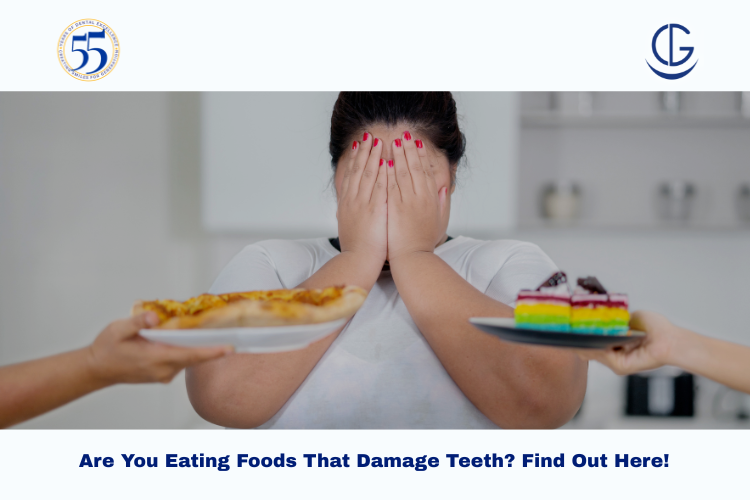Schedule Appointment



Looking to protect your smile? Here’s everything you need to know about foods that damage teeth. At Dr. Gowds Dental Hospital—Hyderabad’s premier dental care provider—we help you understand the worst offenders for your teeth and gums, and offer smart, tooth-friendly alternatives. From enamel erosion to cavity-causing snacks, this guide uncovers how your diet and oral health are connected and what changes you can make to safeguard your smile.
Your teeth may be strong, but they aren’t indestructible. The foods and beverages you consume daily play a critical role in your oral health. Many everyday items contribute to enamel erosion, plaque buildup, and decay. Regular exposure to foods bad for teeth can lead to cavities, discoloration, and even tooth loss if left unchecked.
Understanding which foods that damage teeth to avoid—and what to eat instead—can drastically improve your long-term oral health and reduce dental visits.
Sodas are high in sugar and acid—two of the biggest enemies of your enamel. These drinks promote bacterial growth and cause enamel breakdown.
Why it’s bad: Sugar feeds bacteria, leading to acid production that erodes enamel.
Instead, try: Water infused with cucumber, mint, or lemon (in moderation). Unsweetened iced teas or plain sparkling water are better choices too.
While they seem harmless, hard candies stay in your mouth for long periods, giving bacteria more time to thrive.
Why it’s bad: Long exposure to sugar leads to decay, and biting them can chip teeth.
Instead, try: Sugar-free xylitol gum. It freshens breath and helps wash away food particles.
Oranges, lemons, and grapefruits are acidic. Even though they’re packed with vitamin C, too much can wear down enamel.
Why it’s bad: Acids soften enamel, making it vulnerable to decay.
Instead, try: Bananas, apples, or berries. They’re less acidic and packed with nutrients.
You may not consider ice a “food,” but many people chew it regularly, which can harm your teeth.
Why it’s bad: It can crack or chip teeth and damage fillings or crowns.
Instead, try: Crunchy veggies like carrots or cucumber slices.
Often seen as a healthy snack, dried fruits are sticky, sugary, and cling to teeth.
Why it’s bad: Their texture makes it easy for sugar to stay on your teeth, promoting decay.
Instead, try: Fresh fruits or rinse your mouth with water immediately after eating dried ones.
When chewed, starchy foods like white bread turn into sugar and stick between your teeth.
Why it’s bad: Trapped food feeds bacteria and contributes to decay.
Instead, try: Whole grain or sprouted grain breads which are less sticky and contain more nutrients.
Alcohol reduces saliva flow, making your mouth dry—a condition that encourages bacterial growth.
Why it’s bad: Less saliva = less natural protection against plaque.
Instead, try: Drink in moderation and alternate with water to stay hydrated.
Chips break down into starch and get lodged in teeth crevices.
Why it’s bad: Bacteria thrive on residual starch.
Instead, try: Air-popped popcorn or fresh vegetable snacks.
Marketed as healthy, these drinks are often more harmful than soft drinks due to their high sugar and acid levels.
Why it’s bad: They lead to enamel erosion and sugar-fueled decay.
Instead, try: Coconut water or plain water for rehydration.
While coffee and tea alone aren’t the problem, adding sugar or drinking them frequently without rinsing can lead to staining and decay.
Why it’s bad: Causes stains and increases acid levels when combined with sugar.
Instead, try: Unsweetened versions with milk. Rinse or brush after drinking.
Now that we’ve looked at foods that damage teeth, here’s what to eat more often:
Rich in calcium and phosphate, they help protect enamel and neutralize acid.
Spinach and kale are high in folic acid and calcium, both great for your gums and teeth.
Apples, carrots, and celery increase saliva and gently scrub teeth.
Almonds, sunflower seeds, and Brazil nuts are low in sugar and high in essential minerals.
Loaded with antioxidants and polyphenols, they reduce plaque and fight bacteria.
If you’re experiencing sensitivity, bad breath, discoloration, or pain, it may be due to foods that damage teeth. These symptoms can signal enamel erosion or underlying decay.
Dr. Gowds Dental Hospital in Hyderabad offers comprehensive evaluations, digital scans, and personalized treatment plans. Whether it’s prevention or treatment, we’ve been leaders in diet and oral health care for over three decades.
Schedule your consultation today to catch small problems before they become big ones.
At Dr. Gowds Dental Hospital, we’re committed to helping you maintain a beautiful, healthy smile for life.
Sugary sodas, sticky candy, and acidic fruit are the big offenders based on their sugar and acid content.
No, once it is gone, it will not regenerate. Fluoride treatments and changing your diet can help prevent further erosion of enamel.
Foods such as cheese, leafy greens, apples, and almonds are good for teeth as they clean teeth and help to protect enamel.
Diet and oral health are directly connected. What you eat can affect saliva, bacterial growth, enamel’s strength, and gum health.
Dr. Gowds is recognized for excellent patient care, advanced technology, and more than 30 years of experience with patients dealing with food that harms their teeth. We are trusted across Hyderabad for great dental care.